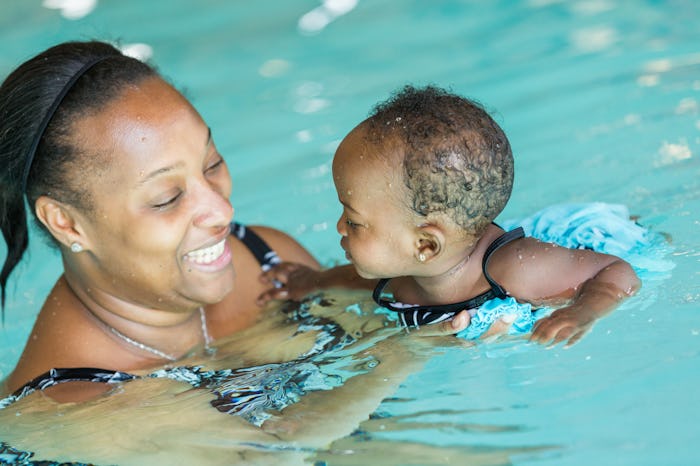Life

You Might Be Surprised At How Young Babies Can Actually Learn To Swim
For safety reasons, many parents want to start their kids in swim lessons as soon as possible. Knowing when it's time to dip those toes in the water can be tricky, though. Can babies learn to swim, or is this a skill developed later in life? As it turns out, infants can start learning water safety skills from a very young age.
Most babies can start taking swim lessons when they're just a few months old. "We feel 3.5-4 months is the youngest to start," prenatal swim instructor, co-owner of AquaBeba, and mother of two Heidi M. Reiss tells Romper via email. "We start at 4 months as we wait till they are a bit stronger." Additional swim instructors echoed this advice. "Babies can definitely learn how to survive in the water. Survival swimming is the ability of a baby to float and breathe, regardless of the water’s depth, for an indefinite period of time," as Judy Heumann, director of Infant Aquatics, tells Romper. The exact age at which your kid begins lessons will also depend on your child's own developmental pace. "Children as young as six months can learn to swim with their face in the water and rotate onto their back to rest and breathe," says Maureen Minervini, certified PediaSwim instructor, who recommends lessons as soon as a child begins to crawl and become mobile. For the most part, infants around the ages of 4 to 6 months can start taking swim lessons with a pro.
However, you don't have to wait that long to help get your kid accustomed to the water. In fact, all of the experts recommended ways to help your baby get comfortable in the water from day one. "The best thing that parents can do to help babies feel more comfortable around the water is to get their baby accustomed to having water in their face during bath time," says Heumann. "Starting with newborns, squeeze a wash cloth over the top of their head. Then switch to pouring a cup of water over their head. Laugh and have fun with your baby while doing this and your baby will soon be on the way to learning the most essential swimming skill — the ability to hold their breath." Really, bath time is a great opportunity to work on your kid's comfort level in the water. Minervini recommends a similar exercise of pouring water over your kid's head "as soon as your child's umbilical stump heals." As the experts agree, these aquatic skills should begin as soon as possible for infants.
That said, be prepared for these lessons about water safety to continue for many years. Teaching your baby how to swim "takes time and dedication," says Reiss. "People often think that they can learn in one session. Starting young can take years but it will make it so your baby never knows a life without water." Not only will your kid have a strong grasp of these important water survival skills, but they can also develop a lifelong love for swimming at this young age. Because the benefits are tremendous, go ahead and dive in to swim lessons as soon as your baby is old enough to join.